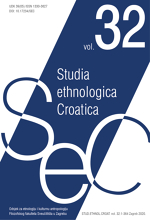Autobiographical narratives about pregnancy experience: symbols, myths, interpretations
Autobiographical narratives about pregnancy experience: symbols, myths, interpretations
Author(s): Oksana Labaschuck, Tetiana Reshetukha, Tetiana HarasymSubject(s): Anthropology, Social Sciences, Gender Studies, Cultural Anthropology / Ethnology
Published by: Sveučilište u Zagrebu, Filozofski fakultet
Keywords: natal narrative; oral tradition; narrative interview; stories about pregnancy; chronotope of paradise; carnival motifs;
Summary/Abstract: The article examines how texts that accumulate and transmit dominant social ideas about motherhood are created through the oral tradition. This research is based on the personal stories of roughly 500 women about their personal experiences of pregnancy and childbirth, recorded using the narrative interview method. Natal narratives are viewed as a sign of culture from the semiotic perspective. The study uses a series of anthropological methods to interpret women's pregnancy experiences. It is shown that modern Ukrainian women’s stories about the pregnancy experience use a number of stereotypical motifs based on the oral narrative tradition. The most common are the motif of pregnancy as a chronotope of paradise and carnival motifs in describing the pregnant woman’s bodily experience.
Journal: Studia ethnologica Croatica
- Issue Year: 2020
- Issue No: 32
- Page Range: 283-307
- Page Count: 25
- Language: English

